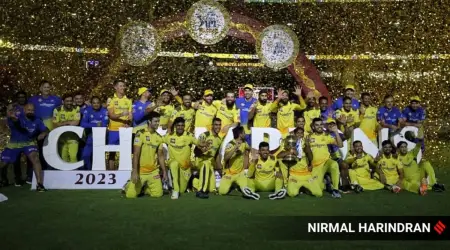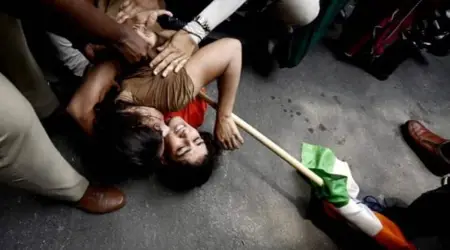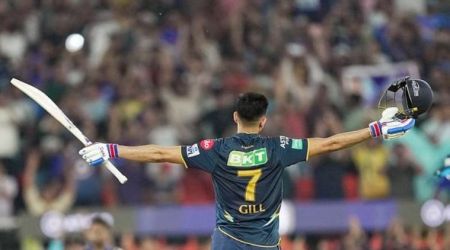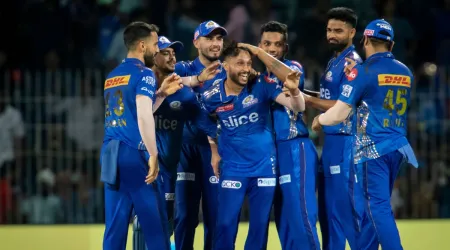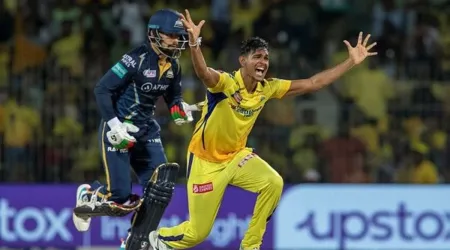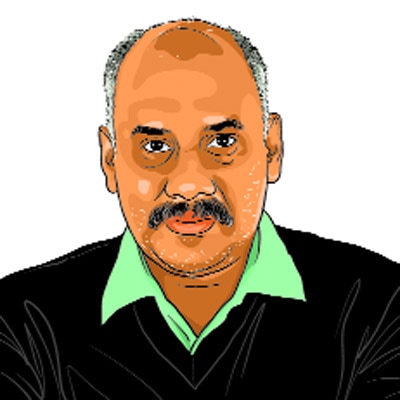How the government failed to read the resilience, stubbornness and jidd of the wrestlers
In turning a blind eye to the protest of wrestlers, the ministry was feigning ignorance to not just their mettle on their mat, but the endless struggles of their lives, the defiance and stubbornness that had shone throughout their career.
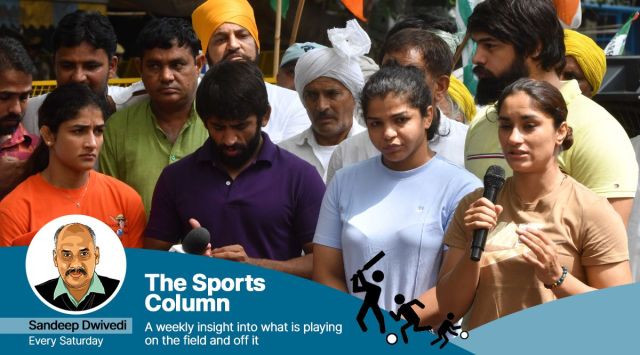 Wrestlers Sangeeta Phogat, Bajrang Punia, Sakshi Malik and Vinesh Phogat the protest march towards new Parliament building. (Express Photo by Amit Mehra)
Wrestlers Sangeeta Phogat, Bajrang Punia, Sakshi Malik and Vinesh Phogat the protest march towards new Parliament building. (Express Photo by Amit Mehra) Why did the government take close to five months to warm up to the protesting wrestlers? How come in a matter of days the Sports Minister Anurag Thakur changed his stand from “we have done everything the wrestlers asked for” and “now the law will take its course” to “we are willing to have a discussion” and “chargesheet will be filed by June 15”?
Hidden in this spectacular climbdown is the failure of the government to understand the gravity of sexual harassment allegations against the erstwhile WFI chief BJP MP Brij Bhushan Saran Singh and also the resolve of the Olympians—Vinesh Phogat, Sakshi Malik, Bajrang Punia—at the helm of the protest. The wrestlers have shown that they aren’t some seasonal sloganeers. This realisation has dawned late on the government negotiators.
For months now, there has been an attempt to dismiss the Jantar Mantar sit-in as a politically backed move by opportunists to take over WFI. In their frantic search for the layers of intrigue, the authorities remained blind to the crystal clear core of the case—the seven police complaints with graphic details of repeated abuse by Singh.
On the eve of the new parliament opening, with the wrestlers planning a march to the capital, there were late night talks to pressurise the protestors. The wrestlers didn’t relent. They took to the streets and got detained. The pictures of Delhi Police’s high-handedness went viral, the International Olympic Council (IOC) found them disturbing and the global media put them on their front pages.
 Wrestlers Bajrang Punia, Sakshi Malik with Sports Minister Anurag Thakur in New Delhi on Wednesday. (Express photo by Prem Nath Pandey)
Wrestlers Bajrang Punia, Sakshi Malik with Sports Minister Anurag Thakur in New Delhi on Wednesday. (Express photo by Prem Nath Pandey)
The Sports Ministry should have known the country’s top wrestlers better. Vinesh, Sakshi and Bajrang are masters of a sport that gives an athlete just six-minutes to showcase the skills they have sharpened for years. Their minds don’t freeze under duress, they can’t be hustled into making rushed decisions. The ticking clock is their bio-rhythm, they know how to stretch seconds. Their aggression isn’t about bravado, it is a calculated computation of rewards and risk.
The backstories of wrestlers, all from modest families from rural areas, have long periods of hopelessness. They haven’t got anything easy. They fight, they fall, they stand, they win—that’s been their life story.
World Championship medalist Vinesh has been the face of the protest. A self-proclaimed “moofat” (straight talker), she by her own wish, mostly keeps away from the high-profile negotiations. She is the Stubborn One, the hard nut that doesn’t crack easily. It’s the time and place that shapes a person’s character and Vinesh had no option but to be strong-willed and stubborn.
Vinesh was 9 when her father was shot dead by, what the family says, a mentally unstable relative at the front gate of their home. In their neck of the woods, Vinesh says, the life of a young widow was a curse. On the day her father died, mother Premlata lost the right to smile. It could be wrongly interpreted by the village’s men folk.
 Delhi News Live Updates: India’s top wrestlers Vinesh Phogat, Bajrang Punia and Sakshi Malik are protesting against WFI chief Brij Bhushan Sharan Singh on sexual harassment allegations
Delhi News Live Updates: India’s top wrestlers Vinesh Phogat, Bajrang Punia and Sakshi Malik are protesting against WFI chief Brij Bhushan Sharan Singh on sexual harassment allegations
Within a year of her father’s death, Premlata’s scans showed cancer. For the housewife, unaccustomed to the world outside home, this was a bolt from the blue. For chemotherapy she had to travel by bus to Rohtak. Illiterate and alone, she had to embrace the unknown, familiarise the unexplored. Circumstances would give Premlata a crash course in being worldly wise and be the single mother of a sporting icon.
Last month at Jantar Mantar, on a sultry May evening, Vinesh had agreed for an Idea Exchange with The Indian Express sports team. During the interaction that went on for more than an hour, Vinesh got emotional when asked about mother. Hidden in the answer was the reason behind the stubbornness of the tough nut.
“No one supported my mother. We grew up seeing her struggle. If a single woman, who was illiterate, could fight society on her own and make us big wrestlers, then we can do it too. If we don’t speak out today, then all the struggles of my mother would have gone to waste. I won medals, that’s all right, but if we win this battle, she will proudly say, ‘I gave birth to them’,” she would say.
Sakshi too was an outlier in society where wrestling wasn’t a common career choice for young girls. Unlike the Phogats, she wasn’t from a wrestling family. Her father was a Delhi Transport Corporation (DTC) driver and mother an anganwadi worker. Back in the day, girls didn’t train with boys. Sakshi’s coach Ishwar Dahiya once told this paper the taunts he had to hear when his academy turned gender neutral. “I was told that I was mad to have boys and girls wrestle together. Kya sher aur bakri ek ghat se peete hain? (Can a lion and a goat drink water from the bank?)” he says. The male as predator, the female as prey – it was a sickening, but apt, stereotype for a society where gender disparity had been normalised.
 Security personnel detain wrestlers Vinesh Phogat and Sangeeta Phogat before their planned protest march towards the new Parliament building. (Express file photo by Amit Mehra)
Security personnel detain wrestlers Vinesh Phogat and Sangeeta Phogat before their planned protest march towards the new Parliament building. (Express file photo by Amit Mehra)
Once again it was the mother’s push that put an Indian wrestler on the world stage. It was she who forced the family to sell their old home and move closer to the stadium where she trained. They were driven, they didn’t want their sacrifice to go to waste. .
In the medal bout at Olympics, Sakshi was trailing 1-5 with two minutes to go. Lesser wrestlers would have given up but Sakshi was patient. She knew she had to pounce but the timing of the killer move had to be perfect. Her trademark ‘double leg’ attack gave her an 8-5 lead and a historic bronze. “Even when I trailed I knew I could win. I had to win,” she would say. At Jantar Mantar, for these past few months, that same ‘I had to win’ belief prevails.
Bajrang, the engine behind the protest, epitomises this positivity. Known as the comeback man, he is at the head of the table at all negotations. Stories of his endurance are part of Indian wrestling circuit. It is said that once the Olympic bronze medalist did more than 1000 squats. It’s his strength and stamina that make him the last man standing at most bouts. Most of his famous wins are because of his final flourish. He tires his opponents, waits for an opening and drives in like a truck. Just when the world thinks he has sunk, he unties the ropes and surfacing triumphantly over the waters like Houdini.
At the post Tokyo Olympics Express Adda in 2021, the two medalists Bajrang and Neeraj Chopra had come together to share their success stories. Here, he dwelled on a trait that makes them world beaters. It was after Bajrang gave the behind-the-scenes story of the bronze medal bout which he won with an injured knee.
“The doctor had said you are responsible if you play because your injury can become worse and you might need surgery. I said even if it breaks, it doesn’t matter…. An Olympic medal comes first,” he had said.
Nodding his head all through Bajrang’s answer, Chopra would intervene. “In Haryana, we have a saying, ke karegi tayari jab ladegi jidd aari, meaning sometimes our preparation may not be as good, but it’s our stubbornness that helps us win”. At least, the Sports Ministry should have known the jidd of our wrestlers.
Send your feedback to sandydwivedi@gmail.com













